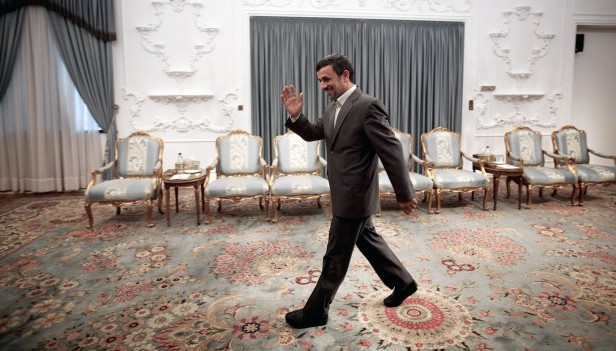
Iranian President Mahmoud Ahmadinejad waves as he arrives for a meeting in Tehran on June 23, 2013. (AFP PHOTO/BEHROUZ MEHRI)
In a letter to Rouhani published in local media on Tuesday, Ahmadinejad wrote: “I’ve heard what has been said about Iran’s former government, and those are unfair and baseless accusations.”
“For the country’s sake, I kept silent. However, the people [and] political and economic experts wanted me to speak out. Therefore, I am offering to hold a friendly debate to settle the differences,” the letter reads.
Since leaving office, Ahmadinejad has for the most part kept a low profile. This letter follows recent accusations from Rouhani—who succeeded Ahmadinejad as president in August—that his predecessor burdened Iran with serious debts and squandered the country’s oil revenues.
Rouhani made the accusations during a live TV address in which he spoke about his first 100 days in office.
In response to Ahmadinejad’s call for a debate, Rouhani’s advisor, Akbar Torkan, said that the administration welcomes the idea.
“We welcome the debate, but only if Ahmadinejad speaks the truth,” Torkan was reported as saying by the Mehr news agency.
“Ahmadinejad and President Rouhani are currently not on the same level to have debates, but we welcome the fact that the head of the previous government is willing to be responsive to criticism,” he said.
As well as criticism of his economic record, the ex-president is also facing the prospect of legal prosecution. Nine complaints have been lodged against him, some dating back to his final months as president.
Last week, he failed to appear in court to answer a summons issued in June, in response to a case lodged against him by the speaker of parliament, Ali Larijani, and others.
Ahmadinejad had been due to appear before the court in Tehran on November 26 for a preliminary hearing, but did not show up.
The cases brought against the former president include charges of creating delays in the operation of the Ministry of Sport and Youth Affairs, a failure to organize the National Iranian Oil Company, and a failure to allocate the budget for Iran’s metro transport system.
According to Iran’s prosecutor general, Gholam-Hossein Mohseni-Eje’i, “another session for the court is scheduled to be held in around one month in Tehran.”
